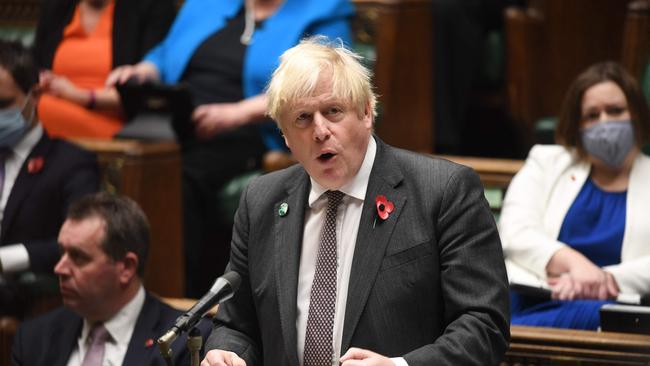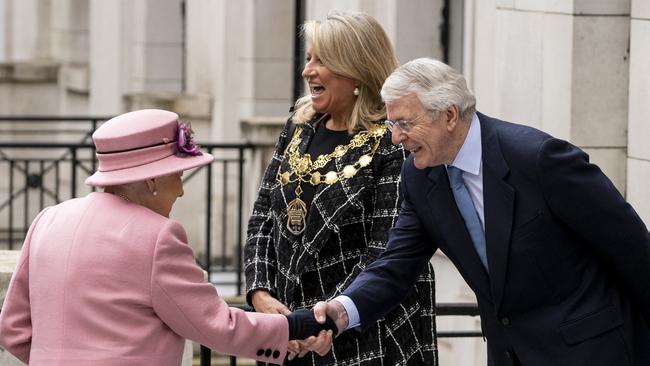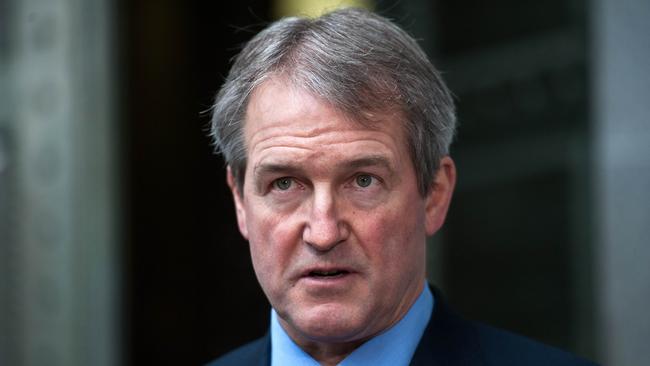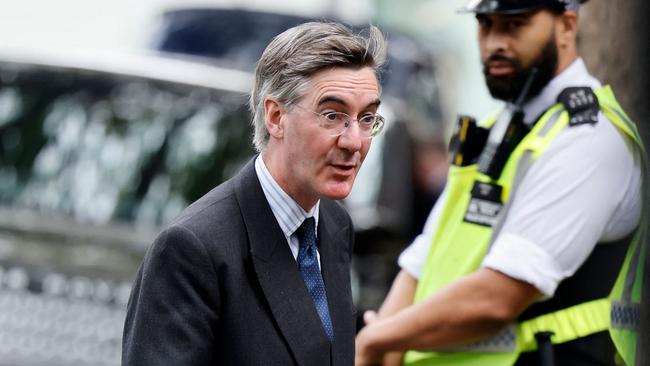You thought last week was bad, Boris Johnson? Just look ahead
The latest sleaze scandal has triggered a deep crisis for Boris Johnson. John Major has labelled the government politically corrupt, with Commons set to launch a new attack.

Boris Johnson had been looking forward to a relaxing break at Chequers, his country retreat in Buckinghamshire, after one of the most chaotic weeks of his premiership.
It was not to be. On Saturday morning, Sir John Major, the prime minister who presided over the “cash-for-questions” scandal and the creation of the modern standards system, put Owen Paterson back on the agenda, describing Johnson’s government as “politically corrupt”.

Far from being able to put his woes behind him, Johnson will start the week facing fresh questions about sleaze and his personal conduct. On Monday, opposition parties will heap embarrassment on the prime minister during an emergency debate. Paterson, 65, who was found to have breached parliamentary standards over lobbying, decided to quit the Commons last week. It followed two extraordinary days in which the government whipped MPs to back a call to halt his suspension, only to U-turn the next day.
Monday’s three-hour session is likely to see MPs “slinging mud” directly at Johnson, revisiting questions about the funding of his Downing Street flat refurbishment and his holiday in Mallorca.

Later, Sir Lindsay Hoyle, the Commons Speaker, will lay out his plans to “protect the integrity” of parliament. He is expected to bring forward proposals to set up an independent review of the parliamentary standards committee. It is understood that retired clerks may be approached to lead the review after Lord Evans of Weardale, the former head of MI5, the domestic security service, and chairman of the committee on standards in public life, was ruled out of the running. The new committee will examine proposals, thought to have the support of most MPs, to introduce an appeals process for members found to have breached the rules.
A source close to the Speaker said: “He has got to listen to what MPs are saying in Monday’s debate before taking decisive action. But he is clear he will have to step in to protect the integrity of parliament if no other solution is forthcoming.”
Johnson is facing calls for an investigation into reports of a “cash-for-votes” scandal after claims last week that Conservative MPs were told they would lose government funding if they failed to support the overhaul of the complaints system. They were whipped to vote in favour of an amendment by Dame Andrea Leadsom to delay Paterson’s suspension until a new committee proposed changes to the oversight rules.
Sir Ed Davey, leader of the Liberal Democrats, has written to Simon Case, the cabinet secretary, demanding an inquiry into whether the government has “misused public funds to try to get their own MP off the hook”. Sir Keir Starmer, the leader of the Labour Party, has written to Lord Bew, chairman of the House of Lords appointments commission, to seek his reassurance that Paterson will not be given a peerage.
Labour has also demanded an investigation into Kwasi Kwarteng, the business secretary, after he said that Kathryn Stone, the parliamentary commissioner for standards who presided over the Paterson investigation, should “consider her position”. It was claimed his comments amounted to “bullying” and might have breached the ministerial code. Kwarteng’s intervention looks even worse this weekend after it emerged that Stone had been given police protection after a series of death threats were made against her in the aftermath of Wednesday’s vote.
A source close to Stone said “She has had some really awful threats ... During this process she has been likened to [Sir] David Amess’s murderer and the IRA. People have accused her of killing Paterson’s wife [who took her own life] and all that kind of crap ... It’s really not nice but she is a tough cookie.”
Chris Bryant, chairman of the committee on standards, said: “It is shocking that these unsubstantiated and mendacious attacks on her integrity have led directly to an officer of the House requiring protection of this kind.”
As well as changes in parliament, the Paterson scandal may lead to changes in and around No 10. There are claims that Johnson was failed by his advisers, the chief whip and Jacob Rees-Mogg, the Commons leader, who had either naively believed or deliberately peddled the narrative backed by Paterson’s supporters: that he had a righteous case and deep and wide support on the back benches.
On Tuesday Dehenna Davison, 28, the MP for Bishop Auckland, Co Durham, sent an email to dozens of fellow parliamentarians. Attached was a hand-signed letter from Paterson saying he was “utterly dismayed by his treatment” and proclaiming that, thanks to his lobbying, “British milk is safer and lives have been saved”.
On the face of it, the backing of the so-called red wall MP was symbolically important, but one MP detected the hand of Rees-Mogg: Davison was his parliamentary aide.
Some remain annoyed at Rees-Mogg for taking so long during his Commons speech on Wednesday, giving greater prominence to the intervention of those who spoke against the government.

Even though the government was likely to have its majority, even a small rebellion would make life difficult. On Wednesday, before the Commons vote, two Tory MPs are understood to have visited Johnson and told him it was “morally wrong” to exonerate Paterson.
Downing Street aides do not yearn for the days of Dominic Cummings, Johnson’s former senior aide, but last week’s events have led to questions over why no one else was able to get to Johnson to tell him of the peril ahead.
Rees-Mogg is understood to hold himself and Mark Spencer, the chief whip, equally responsible for failing to advise Johnson adequately. Leadsom, the former leader of the house, is also understood to regret her involvement and has been forced to deny that she took up the baton after being promised a return to the cabinet.
But others feel Johnson should not have had to rely on them in the first place and believe he has no political aide capable of keeping him focused on strategic rather than tactical matters. “Dissembling and reassembling the Commons ethics system is not even nearly on his agenda,” said one Conservative MP. “Or, it shouldn’t be.”
One No 10 source pointed the finger at Declan Lyons, head of the political unit. The source said the political team had failed to function. Johnson was neither aware of the scale of dissent on the Tory backbenches, nor the reality of Paterson’s conduct.
They also made the incendiary suggestion that decision makers in No 10, including the chief whip and political aides, may not have even read the original report into wrongdoing by Paterson.
Johnson’s status as an election winner, and the absence of a political threat from No 11, means his safety is assured. But MPs are pragmatic: once he ceases to be an asset, the bond between him and the party will be fractured sooner than was the case for other former leaders.
One MP suggested they were “sharpening their quill” to write a letter for safekeeping by Graham Brady, the custodian of the Tory backbenches who chairs the 1922 Committee.
Most MPs are relaxed about the byelection in North Shropshire, where Paterson had a majority of more than 20,000. The contest is likely to be at Christmas, and Labour will struggle to get out the vote.
One thing that may fill older MPs with dread is the symbolic spectre of Martin Bell, who ran against Neil Hamilton on an anti-sleaze ticket in 1997. On Friday, the 83-year-old was called by the Liberal Democrats, who offered him the chance to be their candidate.
It is the sort of deja vu most Tories could do without.
The Sunday Times



To join the conversation, please log in. Don't have an account? Register
Join the conversation, you are commenting as Logout